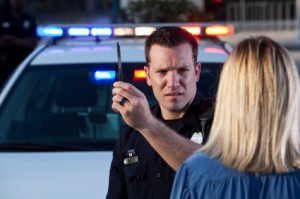 If you have been pulled over and the police officer suspects you are intoxicated he is likely to ask you complete field sobriety testing. Having to complete these tests may be very nerve-wrecking and if you are not legally intoxicated the fear of failing these may be overwhelming. When an officer is administering these tests there are certain cues that he is looking for to determine how intoxicated a driver may be. Ideally an officer should administer at least three of these tests before deciding if he should make an arrest or not. Here I will examine the most popular tests that are administered in South Carolina and what an officer is generally looking for to determine if someone is intoxicated.
If you have been pulled over and the police officer suspects you are intoxicated he is likely to ask you complete field sobriety testing. Having to complete these tests may be very nerve-wrecking and if you are not legally intoxicated the fear of failing these may be overwhelming. When an officer is administering these tests there are certain cues that he is looking for to determine how intoxicated a driver may be. Ideally an officer should administer at least three of these tests before deciding if he should make an arrest or not. Here I will examine the most popular tests that are administered in South Carolina and what an officer is generally looking for to determine if someone is intoxicated.
1. The Walk and Turn test – this test is administered by asking the driver to walk in a straight line with his hands down by his side, stepping heel to toe, for a certain number of steps then turning around and completing the same task. Once the officer has given instruction on how to complete the test he is looking to see how well the person balances while completing the test. If the person cannot keep their hands down by their sides to keep balance or is unable to walk heel to toe this will be noted and used as a cue the person may be intoxicated. At the same time he is also looking to see if the person can follow his directions on completing the test exactly as he gave them.
2. The One Legged Stand test – this test is administered by asking the driver to stand with both hands kept down by his side, then raise one foot approximately six inches off the ground with the toe pointed upward while looking down at it and counting aloud. While this test is being completed the officer is looking for the same type of cues as he was during the walk and turn test. He is looking to see how well the person can balance and if he can follow directions exactly as given. If the person cannot keep his hands down by his side and maintain balance or keeps dropping his foot this is noted to be used against the person.
3. The Horizontal Gaze Nystagmus test – this test is administered by having a person track an object using only their eyes and not turning his head at all. This test was designed to observe certain physical reactions in the eye that result from being intoxicated. The officer is looking at the pupil to see when it starts to jump as it is tracking the object. Generally the sooner the pupil begins to jump as it is tracking the more intoxicated the person is.
If you are pulled over and asked to complete these tests remember it is voluntary. You have the right to say no to complete any field sobriety testing for the police officer. An officer may try to talk you into it by saying he will let you go if you pass the tests or any other similar persuasion but it is still better to decline completing any field sobriety tests as they will be used against you.